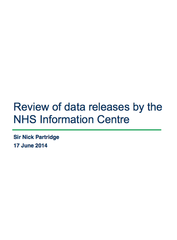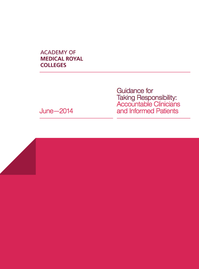NEWS - JUNE 2014
Information for Healthwatch aims to pick up DH, CQC, LGA, NHSE, HWE Monitor and other reports that Local Healthwatch will need to know about and to pass on other information I glean from other sources, including the King's Fund Health Policy and Management Alerts and HAPIA (NALM). It can't be comprehensive, so if you know of anything I should include please let me know, E&OE!
Reforming the NHS from within: beyond hierarchy, inspection and markets,
This King's Fund report argues that politicians’ role in the running of the NHS needs to be better defined to counter interventionist and centralising tendencies that have hampered effective reform to date. It makes the argument that a new political settlement is needed that clarifies the strategic role of Ministers in determining funding, establishing priorities and providing accountability to Parliament, and leaves local NHS leaders with the space to innovate and lead service change. This settlement should reflect lessons learnt from the experience of the present government’s health reforms, which have failed to distance Ministers from the operational management of the NHS as originally intended. http://www.kingsfund.org.uk/sites/files/kf/field/field_publication_file/reforming-the-nhs-from-within-kingsfund-jun14.pdf?
Functions of the local public health system
This Faculty of Public Health document sets out the public health functions of local authorities in England and is intended to replace the draft minimum standards for public health teams published by FPH in November 2013. http://www.fph.org.uk/uploads/Functions%20of%20the%20local%20PH%20system%20FINAL%20200514.pdf?dm_i=21A8,2J8WQ,FLWQ30,98LNI,1
Person centred care
National Voices has published a useful resource at http://www.nationalvoices.org.uk/evidence
Smaller Hospitals
Monitor has published a report on the future of smaller hospitalshttps://www.gov.uk/government/uploads/system/uploads/attachment_data/file/320075/smalleracuteproviders-report.pdf
The Accountable Physician Guidance
At the request of DH the Royal College have produced the attached guidance
Qualitywatch
The latest issue http://qualitywatch.cmail1.com/t/ViewEmail/r/F40B1EA6C1D8A3D52540EF23F30FEDED/CED3F0B3464CC75AA7F290B8E8FDC6A0
Reforming the NHS from within: beyond hierarchy, inspection and markets,
This King's Fund report argues that politicians’ role in the running of the NHS needs to be better defined to counter interventionist and centralising tendencies that have hampered effective reform to date. It makes the argument that a new political settlement is needed that clarifies the strategic role of Ministers in determining funding, establishing priorities and providing accountability to Parliament, and leaves local NHS leaders with the space to innovate and lead service change. This settlement should reflect lessons learnt from the experience of the present government’s health reforms, which have failed to distance Ministers from the operational management of the NHS as originally intended. http://www.kingsfund.org.uk/sites/files/kf/field/field_publication_file/reforming-the-nhs-from-within-kingsfund-jun14.pdf?
Functions of the local public health system
This Faculty of Public Health document sets out the public health functions of local authorities in England and is intended to replace the draft minimum standards for public health teams published by FPH in November 2013. http://www.fph.org.uk/uploads/Functions%20of%20the%20local%20PH%20system%20FINAL%20200514.pdf?dm_i=21A8,2J8WQ,FLWQ30,98LNI,1
Person centred care
National Voices has published a useful resource at http://www.nationalvoices.org.uk/evidence
Smaller Hospitals
Monitor has published a report on the future of smaller hospitalshttps://www.gov.uk/government/uploads/system/uploads/attachment_data/file/320075/smalleracuteproviders-report.pdf
The Accountable Physician Guidance
At the request of DH the Royal College have produced the attached guidance
Qualitywatch
The latest issue http://qualitywatch.cmail1.com/t/ViewEmail/r/F40B1EA6C1D8A3D52540EF23F30FEDED/CED3F0B3464CC75AA7F290B8E8FDC6A0
DEPARTMENT OF HEALTH - FREEDOM OF INFORMATION RELEASES
01 January 2014 - 31 March 2014 - 5 pages
See Page 3
01 January 2014 - 31 March 2014 - 5 pages
See Page 3
DUTIES AND POWERS OF LOCAL AUTHORITIES RE. CARE ACT
11 fact-sheets accompany Part 1 of the Care Act 2014: provide an overview and the duties and powers local authorities will have in the future.
https://www.gov.uk/government/publications/care-act-2014-part-1-factsheets
11 fact-sheets accompany Part 1 of the Care Act 2014: provide an overview and the duties and powers local authorities will have in the future.
https://www.gov.uk/government/publications/care-act-2014-part-1-factsheets
WHO'S WHO ... Department of Health's agencies and partner organisations
17 pages
17 pages
- NHS England
- Monitor
- NHS Trust Development Authority
- Care Quality Commission
- National Institute for Health and Care Excellence
- Public Health England
- Health and Social Care Information Centre
- Health Education England
- Health Research Authority
- NHS Blood and Transplant
- Medicines and Healthcare Products Regulatory Agency
- NHS Business Services Authority
- NHS Litigation Authority
- Human Fertilisation and Embryology Authority
- Human Tissue Authority
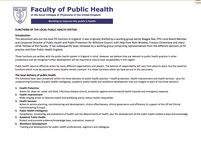
PUBLIC HEALTH - WHAT IS IT, WHAT DOES IT DO?
17 pages
This document sets out the local PH function in England. It was originally drafted by a working group led by Maggie Rae, FPH Local Board Member and Corporate Director of Public Health and Public Protection for Wiltshire Council, with help from Ruth Woolley, Frances Chinemana and many other Fellows of the Faculty.
It has subsequently been reviewed by a working group comprising representatives from the different domains of PH practice and from Public Health England.
17 pages
This document sets out the local PH function in England. It was originally drafted by a working group led by Maggie Rae, FPH Local Board Member and Corporate Director of Public Health and Public Protection for Wiltshire Council, with help from Ruth Woolley, Frances Chinemana and many other Fellows of the Faculty.
It has subsequently been reviewed by a working group comprising representatives from the different domains of PH practice and from Public Health England.
CQC INSPECTION LIST OF GPs
13 June 2014
This month we start inspecting the second wave of GP Practices using our new approach to inspection. The Clinical Commissioning Groups (CCG) areas that have been targeted for inspection are:
13 June 2014
This month we start inspecting the second wave of GP Practices using our new approach to inspection. The Clinical Commissioning Groups (CCG) areas that have been targeted for inspection are:
- Greater Preston
- Oxford
- Lewisham
- Leicester
- South Devon & Torbay
- Wakefield
- Sandwell & West Birmingham
- Gloucester & Newham
- Sunderland
- Cambridge & Peterborough
- Hillingdon
DATA PROTECTION, MEDICAL RECORDS, GPs - Hansard Source (Citation: HL Deb, 11 June 2014, C7W)
Medical Records: Data Protection - House of Lords (Written answers on 11 June 2014
Lord Trefgarne (Conservative)
To ask Her Majesty’s Government what assessment they have made of the present arrangements for the protection of patients' private medical information by general practitioners.
Earl Howe (Conservative)
General practitioner (GP) practices are individually responsible for ensuring that they comply with legal and ethical requirements and central guidance in relation to data protection and patient confidentiality. A majority of GP practices in England provide assurance that they do so by completing annual assessments of their compliance against information governance requirements through the National Health Service Information Governance Toolkit, and the results of these assessments are publicly available.
===============================================================
To ask Her Majesty’s Government what are the rules relating to the release of patients' private medical information to insurance companies by general practitioners.
Earl Howe (Conservative)
General practitioners (GPs) must ensure that patients have provided explicit consent before disclosing information to insurance companies. Additionally, under the provisions of the Access to Medical Reports Act 1988, patients have the right to view medical reports prepared for insurance companies and, where a patient has exercised this right, a GP cannot disclose the report to the insurance company until the patient has had the opportunity to review it or if the patient withdraws their consent.
Medical Records: Data Protection - House of Lords (Written answers on 11 June 2014
Lord Trefgarne (Conservative)
To ask Her Majesty’s Government what assessment they have made of the present arrangements for the protection of patients' private medical information by general practitioners.
Earl Howe (Conservative)
General practitioner (GP) practices are individually responsible for ensuring that they comply with legal and ethical requirements and central guidance in relation to data protection and patient confidentiality. A majority of GP practices in England provide assurance that they do so by completing annual assessments of their compliance against information governance requirements through the National Health Service Information Governance Toolkit, and the results of these assessments are publicly available.
===============================================================
To ask Her Majesty’s Government what are the rules relating to the release of patients' private medical information to insurance companies by general practitioners.
Earl Howe (Conservative)
General practitioners (GPs) must ensure that patients have provided explicit consent before disclosing information to insurance companies. Additionally, under the provisions of the Access to Medical Reports Act 1988, patients have the right to view medical reports prepared for insurance companies and, where a patient has exercised this right, a GP cannot disclose the report to the insurance company until the patient has had the opportunity to review it or if the patient withdraws their consent.
Information for Healthwatch aims to pick up DH, CQC, LGA, NHSE, HWE Monitor and other reports that Local Healthwatch will need to know about and to pass on other information I glean from other sources, including the King's Fund Health Policy and Management Alerts and HAPIA (NALM). It can't be comprehensive, so if you know of anything I should include, please let me know, E&OE!
---------------------------------------------------------------------
The Simon Stevens speech to the NHS Confederation is at:
http://www.england.nhs.uk/2014/06/04/simon-stevens-speech-confed/?utm_source=feedburner&utm_medium=email&utm_campaign=Feed%3A+NHSCBoard+%28NHS+England%29
Use of health and social care by people with cancer
This Nuffield Foundation report presents the results of a study into the primary, secondary and social care use of people diagnosed with cancer. Improved survival rates, earlier detection and an ageing population have led to cancer incidence increasing, but it is now seen as a chronic condition rather than necessarily a fatal illness. This shift has led to a growing focus on survivorship, and on the long-term needs of those living with and after cancer.
To find out how this impacts on the use of health and social care services, the study used data linkage methods to track the patterns of service use across health and social care in the year after people were diagnosed with cancer. It shows clear evidence of a social services response to a person being diagnosed with cancer.
http://www.nuffieldtrust.org.uk/publications/use-health-and-social-care-people-cancer?utm_medium=email&utm_campaign=Health+and+social+care+use+for+cancer+patients&utm_content=Health+and+social+care+use+for+cancer+patients+CID_4e2ac57a0e0e70b7d54f87b56844e7c3&utm_source=Email%20marketing%20software&utm_term=Use%20of%20health%20and%20social%20care%20by%20people%20with%20cancer
Patient and Family-Centred Care toolkit
This King's Fund toolkit is a step-by-step guide to improving processes of care and staff–patient interactions, using a technique called Patient and Family-Centred Care. It aims to offer a simple way for health care organisations to show their commitment to patients’ experience of the care they receive while also attending to the wellbeing of the staff who deliver that care. The toolkit evolved from the Patient and Family-Centred Care programme.
This initiative was run jointly by the Health Foundation and The King’s Fund to develop a small number of exemplary hospitals and a team of professional staff and managers who could demonstrate their achievements to others and bring sustainable improvement in patients' experience and outcomes.
http://www.kingsfund.org.uk/projects/pfcc?utm_
NHSE Bulletin for CCGs 60 5th June is at:
http://www.england.nhs.uk/wp-content/uploads/2014/06/ccg-bulletin-issue-601.pdf
Healthwatch funding 2014 - 2015
This DH letter clarifies the transfer of NHS money to local authorities to support social care with a health benefit. This covers both the main NHS transfer and Better Care Fund preparation. The letter also confirms adults’ personal social services specific revenue and capital grant funding for local authorities for the period 2014 to 2015.
Healthwatches will find the detail useful in discussions with their Councils.
https://www.gov.uk/government/uploads/system/uploads/attachment_data/file/316204/LASSL_DH__2014_1.pdf?
Medicine Management in Care Homes
Care home providers should have a medicines policy that includes written processes. That’s a recommendation from the National Institute for Health and Care Excellence (NICE) in its guideline on managing medicines. A new downloadable checklist provides clear, step-by-step information for health and social care staff who are developing and updating care home medicines policies. It will also be useful for commissioners so that they can ensure that care home providers have processes in place, for the safe and effective use of medicines for residents in care homes.
http://www.nice.org.uk/mpc/medicinespracticeguidelines/ManagingMedicinesCareHomesDraftGuidanceConsultation.jsp
Congenital Heart Disease Review
John Holden's 25th blog is at:
http://www.england.nhs.uk/2014/06/10/john-holden-25/?utm_source=feedburner&utm_medium=email&utm_campaign=Feed%3A+NHSCBoard+%28NHS+England%29
---------------------------------------------------------------------
The Simon Stevens speech to the NHS Confederation is at:
http://www.england.nhs.uk/2014/06/04/simon-stevens-speech-confed/?utm_source=feedburner&utm_medium=email&utm_campaign=Feed%3A+NHSCBoard+%28NHS+England%29
Use of health and social care by people with cancer
This Nuffield Foundation report presents the results of a study into the primary, secondary and social care use of people diagnosed with cancer. Improved survival rates, earlier detection and an ageing population have led to cancer incidence increasing, but it is now seen as a chronic condition rather than necessarily a fatal illness. This shift has led to a growing focus on survivorship, and on the long-term needs of those living with and after cancer.
To find out how this impacts on the use of health and social care services, the study used data linkage methods to track the patterns of service use across health and social care in the year after people were diagnosed with cancer. It shows clear evidence of a social services response to a person being diagnosed with cancer.
http://www.nuffieldtrust.org.uk/publications/use-health-and-social-care-people-cancer?utm_medium=email&utm_campaign=Health+and+social+care+use+for+cancer+patients&utm_content=Health+and+social+care+use+for+cancer+patients+CID_4e2ac57a0e0e70b7d54f87b56844e7c3&utm_source=Email%20marketing%20software&utm_term=Use%20of%20health%20and%20social%20care%20by%20people%20with%20cancer
Patient and Family-Centred Care toolkit
This King's Fund toolkit is a step-by-step guide to improving processes of care and staff–patient interactions, using a technique called Patient and Family-Centred Care. It aims to offer a simple way for health care organisations to show their commitment to patients’ experience of the care they receive while also attending to the wellbeing of the staff who deliver that care. The toolkit evolved from the Patient and Family-Centred Care programme.
This initiative was run jointly by the Health Foundation and The King’s Fund to develop a small number of exemplary hospitals and a team of professional staff and managers who could demonstrate their achievements to others and bring sustainable improvement in patients' experience and outcomes.
http://www.kingsfund.org.uk/projects/pfcc?utm_
NHSE Bulletin for CCGs 60 5th June is at:
http://www.england.nhs.uk/wp-content/uploads/2014/06/ccg-bulletin-issue-601.pdf
Healthwatch funding 2014 - 2015
This DH letter clarifies the transfer of NHS money to local authorities to support social care with a health benefit. This covers both the main NHS transfer and Better Care Fund preparation. The letter also confirms adults’ personal social services specific revenue and capital grant funding for local authorities for the period 2014 to 2015.
Healthwatches will find the detail useful in discussions with their Councils.
https://www.gov.uk/government/uploads/system/uploads/attachment_data/file/316204/LASSL_DH__2014_1.pdf?
Medicine Management in Care Homes
Care home providers should have a medicines policy that includes written processes. That’s a recommendation from the National Institute for Health and Care Excellence (NICE) in its guideline on managing medicines. A new downloadable checklist provides clear, step-by-step information for health and social care staff who are developing and updating care home medicines policies. It will also be useful for commissioners so that they can ensure that care home providers have processes in place, for the safe and effective use of medicines for residents in care homes.
http://www.nice.org.uk/mpc/medicinespracticeguidelines/ManagingMedicinesCareHomesDraftGuidanceConsultation.jsp
Congenital Heart Disease Review
John Holden's 25th blog is at:
http://www.england.nhs.uk/2014/06/10/john-holden-25/?utm_source=feedburner&utm_medium=email&utm_campaign=Feed%3A+NHSCBoard+%28NHS+England%29
LORDS DEBATE PATIENT POWER - Upcoming business - Tuesday, 17 June 2014
Lords: Grand Committee
Lords: Grand Committee
- Giving citizens and patients more power in the National Health Service – Lord Crisp - Debate
- Giving citizens and patients more power in the National Health Service – Earl Howe - Debate
HEALTH SERVICES COMPLAINTS
Robert Buckland (South Swindon, Conservative) - To ask the Secretary of State for Health
(1) What steps he is taking to raise awareness among service users of how to navigate the complaints systems in health and social care;
(2) What steps he has taken to implement improvements in health and social are services arising from complaints and feedback made by service users.
Daniel Poulter (The Parliamentary Under-Secretary of State for Health; Central Suffolk and North Ipswich, Conservative)
The Department is working with partners across the health and care system to make improvements to complaints handling. This includes Healthwatch England working to improve the information and advice that people receive when they need support to raise a concern or make a complaint. It also includes working with the Care Quality Commission as they develop their inspection methodology across health and social care so it places greater emphasis on listening to, and learning from, complaints as well as other sources of patient feedback. A single legislative framework exists for complaints handling to ensure consistency across the health and social care system.
Robert Buckland (South Swindon, Conservative) - To ask the Secretary of State for Health
(1) What steps he is taking to raise awareness among service users of how to navigate the complaints systems in health and social care;
(2) What steps he has taken to implement improvements in health and social are services arising from complaints and feedback made by service users.
Daniel Poulter (The Parliamentary Under-Secretary of State for Health; Central Suffolk and North Ipswich, Conservative)
The Department is working with partners across the health and care system to make improvements to complaints handling. This includes Healthwatch England working to improve the information and advice that people receive when they need support to raise a concern or make a complaint. It also includes working with the Care Quality Commission as they develop their inspection methodology across health and social care so it places greater emphasis on listening to, and learning from, complaints as well as other sources of patient feedback. A single legislative framework exists for complaints handling to ensure consistency across the health and social care system.
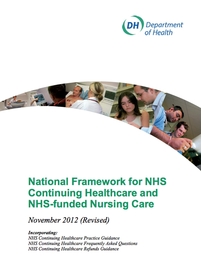
CHS - CONTINUING CARE ASSESSMENTS
140 pages
CSUs (Commissioning Support Units) now have charge of arranging these assessments.
If you manage to get an assessment, ensuring sufficient clinical input can be one of the main challenges .
140 pages
CSUs (Commissioning Support Units) now have charge of arranging these assessments.
If you manage to get an assessment, ensuring sufficient clinical input can be one of the main challenges .
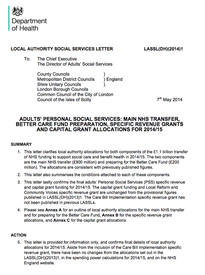
FUNDING LOCAL HEALTHWATCH, etc.
Department of Health - 20 pages
Department of Health - 20 pages
- Adults' Personal Social Services:
- Main NHS Transfer
- Better Care Fund Preparation
- Specific Revenue Grants
- Capital Grant Allocations for 2014 / 2015
NHS STANDARD CONTRACT 2014 - 2015
The provider must:
The provider must:
- 2.1.7 ... respond to any reports and recommendations made by Local Healthwatch;
- 35.2 ... if a complaint received by the Provider from or on behalf of:
- 35.2.1 .. a Relevant Person;
- 35.2.2 .. a Commissioner;
- 35.2.3 Local Healthwatch; or
- 35.2.4 .. any Healthcare Professional involved in the care of the relevant Service User, relates to or includes reference to a failure to disclose a Reportable Patient Safety Incident to that Relevant Person, the Provider must notify the Co-ordinating Commissioner
ROBERT FRANCIS TO JOIN THE CQC - 04 June 2014
Robert Francis is to join the board of the Care Quality Commission, the regulator is set to announce.
Mr Francis led the public inquiry into the scandal of poor care at Mid Staffordshire Foundation Trust, the report of which was published last year and was widely viewed as a watershed moment in the NHS’s approach to care quality.
The government’s response to his inquiry included a major overhaul of the CQC’s approach to inspection.
Mr Francis’ appointment as a CQC Non-Executive Director is due to be announced today.
Robert Francis is to join the board of the Care Quality Commission, the regulator is set to announce.
Mr Francis led the public inquiry into the scandal of poor care at Mid Staffordshire Foundation Trust, the report of which was published last year and was widely viewed as a watershed moment in the NHS’s approach to care quality.
The government’s response to his inquiry included a major overhaul of the CQC’s approach to inspection.
Mr Francis’ appointment as a CQC Non-Executive Director is due to be announced today.
CHAIR OF HEALTH SELECT COMMITTEE STEPS DOWN - 03 June, 2014
Stephen Dorrell has confirmed he has stepped down as chair of the Commons health committee and is leaving the scrutiny body with immediate effect. He said that he wanted to advocate “greater openness to new ideas” in health and social care policy, and that this would be easier to do from outside the Committee.
Mr Dorrell said: “I have enjoyed doing the Select Committee. I believe we have made an important contribution on a cross-party basis to health policy through this Parliament. I’m primarily interested in the challenges facing the health and care system over the next five to ten years and the need for the system to change. These are issues that are better addressed outside the select committee context.”
The former Conservative Health Secretary added that while he had been thinking about stepping down for a number of months, his decision was deliberately timed to come before the new session of parliament, which begins tomorrow. He also voiced his frustration at what he believed was a health system not willing to look at new ideas to improve care delivery.
He said: “It’s very striking that the challenges facing health and care delivery in the UK are really very similar to the challenges facing equivalent systems in countries all across the world. There has been a tendency to think that because we have the NHS, our system is different. The needs of a dementia patient or a diabetes patient are the same whether they live in Liverpool, Frankfurt or Cincinnati. We need to be more open to new thoughts about how to deliver joined-up care that focusses on enabling people to lead normal lives rather than waiting for them to be ill.”
Mr Dorrell ruled out trying to re-enter government in any post-election administration.
Dr Sarah Wollaston, a Conservative member of the committee said: “Stephen has been an outstanding chair because what you want in a select committee chair is someone who impartially going to be holding government and institutions to account. He has done that very effectively – he has managed to maintain a broad consensus.”
His exit creates a vacancy on the Committee, which will be filled following a vote of Conservative MPs. -
Stephen Dorrell has confirmed he has stepped down as chair of the Commons health committee and is leaving the scrutiny body with immediate effect. He said that he wanted to advocate “greater openness to new ideas” in health and social care policy, and that this would be easier to do from outside the Committee.
Mr Dorrell said: “I have enjoyed doing the Select Committee. I believe we have made an important contribution on a cross-party basis to health policy through this Parliament. I’m primarily interested in the challenges facing the health and care system over the next five to ten years and the need for the system to change. These are issues that are better addressed outside the select committee context.”
The former Conservative Health Secretary added that while he had been thinking about stepping down for a number of months, his decision was deliberately timed to come before the new session of parliament, which begins tomorrow. He also voiced his frustration at what he believed was a health system not willing to look at new ideas to improve care delivery.
He said: “It’s very striking that the challenges facing health and care delivery in the UK are really very similar to the challenges facing equivalent systems in countries all across the world. There has been a tendency to think that because we have the NHS, our system is different. The needs of a dementia patient or a diabetes patient are the same whether they live in Liverpool, Frankfurt or Cincinnati. We need to be more open to new thoughts about how to deliver joined-up care that focusses on enabling people to lead normal lives rather than waiting for them to be ill.”
Mr Dorrell ruled out trying to re-enter government in any post-election administration.
Dr Sarah Wollaston, a Conservative member of the committee said: “Stephen has been an outstanding chair because what you want in a select committee chair is someone who impartially going to be holding government and institutions to account. He has done that very effectively – he has managed to maintain a broad consensus.”
His exit creates a vacancy on the Committee, which will be filled following a vote of Conservative MPs. -
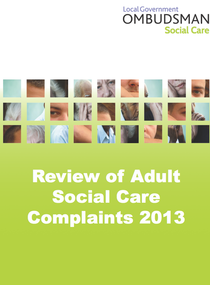
ADULT SOCIAL CARE COMPLAINTS 2013 - 28 May 2014 - 42 pages
The Local Government Ombudsman has seen a 130% increase in adult social care complaints since it took on responsibility for registered private care providers in 2009.
For the first time the Local Government Ombudsman (LGO) is publishing its complaints statistics for private social care providers and local authorities in a report issued today.
The report highlights the impact that people feel when services let them down. The individual stories published in this report remind us that behind the statistics are the real experiences of people who are relying upon care providers to deliver the services they need.
The Local Government Ombudsman has seen a 130% increase in adult social care complaints since it took on responsibility for registered private care providers in 2009.
For the first time the Local Government Ombudsman (LGO) is publishing its complaints statistics for private social care providers and local authorities in a report issued today.
The report highlights the impact that people feel when services let them down. The individual stories published in this report remind us that behind the statistics are the real experiences of people who are relying upon care providers to deliver the services they need.

DATA - DELAYS AND CONFUSION
The Government agency that distributes NHS data to external research bodies has choked the flow of information while it conducts a wide-ranging review, sparking “frustration” among the researchers and charities which rely on the data.
The Health and Social Care Information Centre told its “customers” in a letter circulated last month [see attached] that the “comprehensive review” of its policies, governance and processes aimed to help build public trust, following the damage inflicted by the Care.data debacle last year.
Care.data is NHS England’s project to link up patients’ hospital and GP data to create a national database for use by NHS organisations and private research organisations.
The letter, by the body’s director of information and analytics Max Jones, offered an apology for “any delays or confusion” caused by the review.
The Government agency that distributes NHS data to external research bodies has choked the flow of information while it conducts a wide-ranging review, sparking “frustration” among the researchers and charities which rely on the data.
The Health and Social Care Information Centre told its “customers” in a letter circulated last month [see attached] that the “comprehensive review” of its policies, governance and processes aimed to help build public trust, following the damage inflicted by the Care.data debacle last year.
Care.data is NHS England’s project to link up patients’ hospital and GP data to create a national database for use by NHS organisations and private research organisations.
The letter, by the body’s director of information and analytics Max Jones, offered an apology for “any delays or confusion” caused by the review.
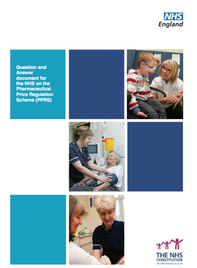
PRICING OF PHARMACY PRODUCTS - Q+A
5 pages
NHS England has issued a short question and answer document on PPRS and what it means in practice.
NHS England will provide more information on how we will work in partnership with industry and NHS colleagues to support the implementation of the PPRS: ensuring patients optimise the use of their medicines to get the best outcomes; and exploring how the NHS, clinicians, other staff and services, and Industry, can support patients to do that.
5 pages
NHS England has issued a short question and answer document on PPRS and what it means in practice.
NHS England will provide more information on how we will work in partnership with industry and NHS colleagues to support the implementation of the PPRS: ensuring patients optimise the use of their medicines to get the best outcomes; and exploring how the NHS, clinicians, other staff and services, and Industry, can support patients to do that.
NEW URGENT CARE ARRANGEMENTS PLANNED
Networks will be the cornerstone for urgent care change – Professor Jonathan Benger
Professor Jonathan Benger, National Clinical Director for Urgent Care for NHS England, updates on the Urgent and Emergency Care Review:
We are changing the way we work to prevent the NHS from being overwhelmed, and to help our patients.
The current system is unsustainable and urgent care desperately needs an overhaul; a concept now widely accepted by patients, healthcare staff and the professions.
Networks will be the cornerstone for urgent care change – Professor Jonathan Benger
Professor Jonathan Benger, National Clinical Director for Urgent Care for NHS England, updates on the Urgent and Emergency Care Review:
We are changing the way we work to prevent the NHS from being overwhelmed, and to help our patients.
The current system is unsustainable and urgent care desperately needs an overhaul; a concept now widely accepted by patients, healthcare staff and the professions.

VIGILANCE AND RISK MANAGEMENT IN MEDICINES DIVISION
Workshop - 02 June 2014 11.00am - 4.00pm 151 Buckingham Palace Road, London, SW1W 9SZ
The MHRA wants to establish a national stakeholder platform for reclassification and good governance of non-prescription medicines. The aim of the platform is to:
• Share views and develop strategies to reach a common approach to supporting patient access to non-prescription medicines;
• Consider how to support access and best use of non-prescription medicines, including after reclassification;
• How to gain evidence of safety and risks of non-prescription medicines in use.
To achieve this, colleagues in the Vigilance and Risk Management in Medicines Division are hosting a Workshop The Workshop will also explore the scope for increasing access to medicines through reclassification within two therapeutic areas:
• The treatment of skin conditions: The workshop will explore the possibility of adding to the types of medicines currently available to treat conditions that can already be treated with over-the-counter (OTC) medicines. The workshop will also consider what other skin conditions might be suitable for treatment with non-prescription
medicines.
• The treatment of erectile dysfunction in men: The group will explore the benefits and risks of increasing access to PD5 inhibitors through reclassification, and how the risks can be managed.
We have the opportunity to include patients/public in this workshop. Is there any assistance you could offer us in terms of promoting this event?
Lunch will be provided and we can cover travel expenses for participants.
Anyone interested should contact Hannah Street, Engagement Manager, Hannah.street@mhra.gsi.gov.uk 020 3080 6129 to book a place - or for more information or to register an interest in the stakeholder forum, even if they can’t make this meeting. Additional information/background will be sent to participants prior to the event.
Workshop - 02 June 2014 11.00am - 4.00pm 151 Buckingham Palace Road, London, SW1W 9SZ
The MHRA wants to establish a national stakeholder platform for reclassification and good governance of non-prescription medicines. The aim of the platform is to:
• Share views and develop strategies to reach a common approach to supporting patient access to non-prescription medicines;
• Consider how to support access and best use of non-prescription medicines, including after reclassification;
• How to gain evidence of safety and risks of non-prescription medicines in use.
To achieve this, colleagues in the Vigilance and Risk Management in Medicines Division are hosting a Workshop The Workshop will also explore the scope for increasing access to medicines through reclassification within two therapeutic areas:
• The treatment of skin conditions: The workshop will explore the possibility of adding to the types of medicines currently available to treat conditions that can already be treated with over-the-counter (OTC) medicines. The workshop will also consider what other skin conditions might be suitable for treatment with non-prescription
medicines.
• The treatment of erectile dysfunction in men: The group will explore the benefits and risks of increasing access to PD5 inhibitors through reclassification, and how the risks can be managed.
We have the opportunity to include patients/public in this workshop. Is there any assistance you could offer us in terms of promoting this event?
Lunch will be provided and we can cover travel expenses for participants.
Anyone interested should contact Hannah Street, Engagement Manager, Hannah.street@mhra.gsi.gov.uk 020 3080 6129 to book a place - or for more information or to register an interest in the stakeholder forum, even if they can’t make this meeting. Additional information/background will be sent to participants prior to the event.

NHS ENGLAND YOUTH FORUM - Event focusing on young people's mental health
12 July 2014 - London
Approx 140 delegates will be about two thirds young people and a third health professionals.
Susanna Hunter Darch, from the British Youth Council is our lead contact for this event. The Agenda is still in development, but will consist of a number of breakout sessions, panel Q and A sessions, a marketplace of stalls and some art workshops. Susanna is currently working with the Youth Forum to identify a diversity of content for the breakout sessions.
We are also extending an invite to organisations who might wish to hold a stall in the marketplace. At our last youth event, Brook brought some of their resources and Naomi was nearly pinned to the floor by the young people in the eager rush!
If you are interested in running a breakout session, or holding a stall – please could you complete the brief form attached (one each for breakout session and stall) and return to Susanna at sdarch@gmail.com by Friday 6th June 2014.
12 July 2014 - London
Approx 140 delegates will be about two thirds young people and a third health professionals.
Susanna Hunter Darch, from the British Youth Council is our lead contact for this event. The Agenda is still in development, but will consist of a number of breakout sessions, panel Q and A sessions, a marketplace of stalls and some art workshops. Susanna is currently working with the Youth Forum to identify a diversity of content for the breakout sessions.
We are also extending an invite to organisations who might wish to hold a stall in the marketplace. At our last youth event, Brook brought some of their resources and Naomi was nearly pinned to the floor by the young people in the eager rush!
If you are interested in running a breakout session, or holding a stall – please could you complete the brief form attached (one each for breakout session and stall) and return to Susanna at sdarch@gmail.com by Friday 6th June 2014.

